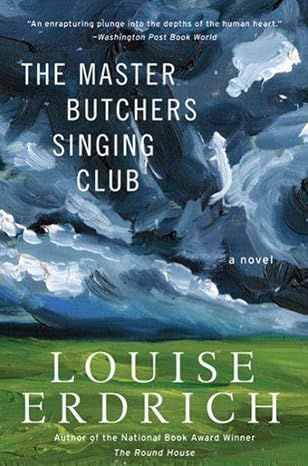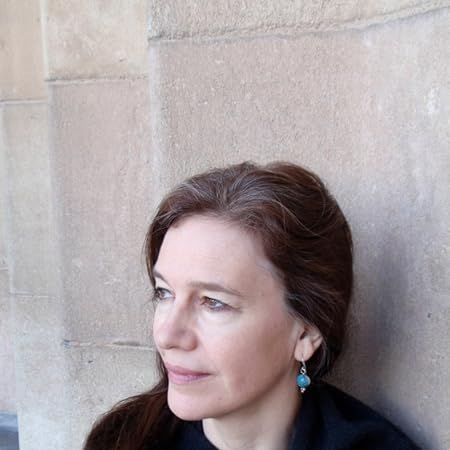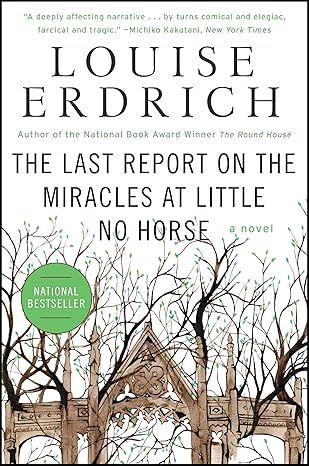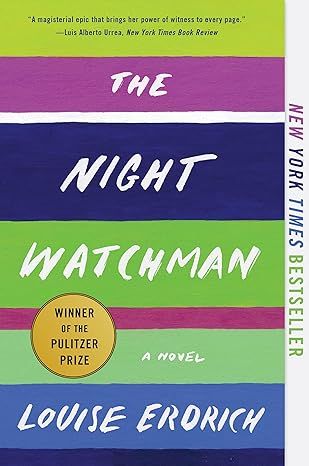The Master Butchers Singing Club: A Novel
4.3
-
1,437 ratings
From National Book Award-winning, New York Times-bestselling author Louise Erdrich, a profound and enchanting new novel: a richly imagined world “where butchers sing like angels.”
Having survived World War I, Fidelis Waldvogel returns to his quiet German village and marries the pregnant widow of his best friend, killed in action. With a suitcase full of sausages and a master butcher's precious knife set, Fidelis sets out for America. In Argus, North Dakota, he builds a business, a home for his family—which includes Eva and four sons—and a singing club consisting of the best voices in town. When the Old World meets the New—in the person of Delphine Watzka—the great adventure of Fidelis's life begins. Delphine meets Eva and is enchanted. She meets Fidelis, and the ground trembles. These momentous encounters will determine the course of Delphine's life, and the trajectory of this brilliant novel.
Kindle
$14.99
Available instantly
Audiobook
$0.00
with membership trial
Hardcover
$1.96
Paperback
$10.86
Ships from
Amazon.com
Payment
Secure transaction
ISBN-10
0060837055
ISBN-13
978-0060837051
Print length
389 pages
Language
English
Publisher
Harper Perennial
Publication date
August 22, 2016
Dimensions
8 x 5.42 x 0.99 inches
Item weight
2.31 pounds
Product details
ASIN :
B000FC12QO
File size :
1976 KB
Text-to-speech :
Enabled
Screen reader :
Supported
Enhanced typesetting :
Enabled
X-Ray :
Enabled
Word wise :
Enabled
Editorial reviews
Amazon.com Review
Louise Erdrich's The Master Butchers Singing Club is a powerfully told story of love, death, redemption, and resurrection. After German soldier Fidelis Waldvogel returns home from World War I to marry his best friend's pregnant widow, he packs up his father's butcher knives and sets sail for America. He settles in Argus, North Dakota, where he sets up a meat shop with his wife Eva, who quickly befriends the struggling yet resourceful Delphine Watzka. Delphine, who runs a vaudeville show with her balancing partner Cyprian Lazarre, has returned home to Argus to care for her alcoholic father. While most of this emotionally rich novel focuses on the changing landscape of small-town life as seen through Delphine and Fidelis's eyes, Erdrich does a masterful job of illuminating hidden dramas through her secondary characters. Erdrich's portrayal of these various townsfolk, including members of the Master Butchers Singing Club, truly shows off her storytelling talent. Her ability to infuse each character with a distinct and multifaceted personality makes this novel an intimate and thought-provoking adventure. --Gisele Toueg
From Publishers Weekly
All of the virtues of Erdrich's best works-her lyrical precision, bleakly beautiful North Dakota settings, deft interweaving of characters and subplots, and haunting evocation of love and its attendant mysteries-are on full display in this superb novel. Drawing on her paternal German ancestry, Erdrich tells the story of Fidelis Waldvogel, a WWI sniper and master butcher with a "talent for stillness" and for singing. After marrying Eva, the pregnant fiancee of his best friend, who was killed in the war, he emigrates to America. Settling in Argus, N.Dak., he and Eva establish a butcher shop known for its Old World expertise and for housing Fidelis's beloved singing club. The focus then shifts to Delphine Watzka, a performer in a traveling vaudeville act, who has recently returned to Argus to care for her alcoholic father, Roy. Roy's health problems pale beside his legal problems: the predatory Sheriff Hock is investigating how the Chavers family came to perish in Roy's basement. Not willing to abandon Roy, Delphine and her vaudeville partner, Cyprian Lazarre, a homosexual Ojibwa, set up house in Argus, where Delphine soon befriends Eva and develops a disturbing attraction to Fidelis. Erdrich's plot spans 36 years, covering two world wars, several violent deaths, near-deaths, illnesses, accidents and crimes-"awful things occurring to other humans," but somehow not to Delphine, who draws on reserves of toughness and compassion to sustain herself as well as the surprisingly vulnerable Waldvogel family. Some readers may be disappointed by the trajectory of the Fidelis-Delphine love story, which is consummated without quite the fireworks display Erdrich seems to promise, but many others will be deeply moved by the complicated romance. With its lush prose, jolts of wisdom and historical sweep, this story is as rich and resonant as any Erdrich has told. Copyright 2002 Reed Business Information, Inc.
From Library Journal
A German soldier straggles home from World War I, marries his best friend's pregnant widow, then picks up a set of butcher knives and heads for North Dakota, where he founds a singing club and encounters the passionate Delphine Watzka. If anyone can make a butcher sing, it's Erdrich. Copyright 2002 Reed Business Information, Inc.
Read more
Sample
ONE
The Last Link
FIDELIS WALKED home from the great war in twelve days and slept thirty-eight hours once he crawled into his childhood bed. When he woke in Germany in late November of the year 1918, he was only a few centimeters away from becoming French on Clemenceau and Wilson’s redrawn map, a fact that mattered nothing compared to what there might be to eat. He pushed aside the white eiderdown that his mother had aired and restuffed every spring since he was six years old. Although she had tried with repeated scrubbings to remove from its cover the stains of a bloody nose he’d suffered at thirteen, the faint spot was still there, faded to a pale tea-brown and shaped like a jagged nest. He smelled food cooking—just a paltry steam but enough to inspire optimism. Potatoes maybe. A bit of soft cheese. An egg? He hoped for an egg. The bed was commodious, soft, and after his many strange and miserable beds of the past three years, it was of such perfect comfort that he’d shuddered when first lying down. Fidelis had fallen asleep to the sound of his mother’s quiet, full, joyous weeping. He thought he still heard her now, but it was the sunlight. The light pouring through the curtains made a liquid sound, he thought, an emotional and female sound as it moved across the ivory wall.
After a while he decided that he heard the light because he was clean. Disorientingly clean. Two nights ago, before he’d entered the house, he begged to bathe in a washtub out in the tiny roofed courtyard, beneath the grape arbor. They built a fire to warm the water. His sister, Maria Theresa, picked the lice from his hair and his father brought fresh clothing. In order to endure all that the war necessitated, including his own filth, Fidelis had shut down his senses. As he opened to the world again, everything around him was distressingly intense and all things were possessed of feeling, alive, as in a powerful dream.
Quietness reverberated in his head. Ordinary sounds, people outside in the streets, seemed marvelous as the chatter of rare monkeys. A thrill of delight crashed through him. Even to put on his clean and vermin-free clothing was a task so full of meaning that the fastening of his grandfather’s gold boar’s-head cuff-links nearly made him weep. Breathing low, he collected himself, and stilled his tears with the power of his quietness. Ever since he was a child, when sorrow had come down upon him, he’d breathed lightly and gone motionless. As a young soldier, he’d known from the first that in his talent for stillness lay the key to his survival. It had carried him through the war as a pitifully green recruit of whom it was soon discovered that, from a sniping post, he could drill a man’s eye at 100 meters and make three of five shots. Now that he was home, he understood, he must still be vigilant. Memories would creep up on him, emotions sabotage his thinking brain. To come alive after dying to himself was dangerous. There was far too much to feel, so he must seek, he thought, only shallow sensations. Now he tried to adjust. He must slowly awaken even to this childhood room he knew so well.
He sat down at the edge of the bed. On a thick shelf set into the wall, his books stood in lines, or stacked as he’d left them, marked with thin strips of paper. For a time, though his occupation was assured, he’d cherished the vision of himself as a poet. Therefore his shelves were stacked with volumes of his heroes, Goethe, Heine, Rilke, and even Trakl, hidden behind the others. He looked at them now with dull curiosity. How could he ever have cared what such men said? What did their words matter? His childhood history was also in this room, his toy soldiers still arranged on the sill. And his young man’s pride: his diplomas and his guild papers framed on the wall. These things did matter. These papers represented his future. His survival. In the closet, his bleached, starched, and pressed white shirts hung ready to embrace him. His polished shoes waited on the shelf beneath for the old Fidelis to put his feet into them. Gingerly, Fidelis tried to slide his feet into the open maws of the stiff shoes, but they wouldn’t go. His feet were swollen, tender from frostbite, peeling, painful. Only his hobnailed boots fit, and they were green inside and stank of rot.
Slowly, he turned to contemplate the day. His bedroom window was a long, golden rectangle. He rose and opened the window, using the ram’s-horn curl of its handle, and looked out, over Ludwigsruhe’s slow, brown river, over the roofs and dead late-fall gardens on its opposite bank, across a patchwork of tender, gray fields, and then a tiny complex of roofs and chimneys beyond. Somewhere in that next town’s maze lived the woman he had never met before, but had promised to visit. He found himself thinking about her with a complex intensity. His thoughts formed questions. What was she doing now? Had she a garden? Was she gathering the final few dusty potatoes from a small, raised, straw-covered berm? Was she hanging out her laundry fresh and white on a piece of icy rope? Was she talking, over tea, to her sister, her mother? Was she singing to herself? And his own presence, what he had promised to tell her. How could he go through with it, and also, how could he not?
EVA KALB, 17 Eulenstrasse. Fidelis stood before the blond-brick walkway, frowning at the frail cast-iron arbor that marked the entrance. The ironwork was threaded with the tough overgrowth of climbing rose stalks, leafless and almost black, huge thorns white at the tip. The walk wasn’t swept and papers littered the front entry. The rest of the block was neatly, fanatically well-kept even in the chaos of defeat. Fidelis found the neglect of Eva Kalb’s house disturbing, perhaps indicating a death in the family already. His eyes filled with tears and he pinched the bridge of his nose—the readiness of his emotions, even in public, horrified him. There was some movement behind a sheer curtain in the front window of the house. Fidelis knew he had been seen, and so, breathing deeply and shrugging himself into a tougher shell, he stepped forward, onto the bricks of the walkway.
She opened the door almost immediately at his knock, so he knew she had been the one at the window, watching him. He knew this was Eva from the picture in his best friend’s locket, which he’d kept. Even now, in the tiny breast pocket of his jacket, the cheap vermeil keepsake made a hot oval lump. Inside the miniature frame was set the hand-colored picture of a woman who looked both capable and delicate, her mouth a sensitive line grooved at the corners by sensuality and shrewdness. Of deepest green, her slanted, indecipherable Magyar eyes now shocked Fidelis with their open, searching gaze. The trained immobility that had helped him to survive the last few years cracked when she looked straight at him. Schnell, die Wahrheit, she said with a preemptive hostility that caused him to obey her directly and to state what he had come to tell: Her lover, her betrothed, her husband-to-be, Johannes, with whom Fidelis had endured all that could be endured, was dead.
Directly afterward, Fidelis wasn’t sure whether he thought or actually said these words, but it did seem to him that sounds had come from his mouth. Although he didn’t hear them, Eva understood—she took the meaning of the sounds into herself with a huge, unsteady breath. That cruel air seemed to dizzy her and her intelligent face lost focus, her expression snapped away, so that Fidelis saw her, for one moment, in the state of a naked being accepting pain. Then Eva Kalb slumped toward him, hands clasped, face calm, in an attitude of prayer. As he caught her and folded her carefully against himself, he understood with a visceral surprise that she was pregnant. Later, privately, Fidelis came to believe that the child had actually knocked from her womb at that moment, its motion touching the helping palm of his hand.
Fidelis lifted his best friend’s fiancée into his arms and stood in the doorway of the house, holding the woman effortlessly, as he would have held a sleeping child. He could have stood there with her for hours. The strength required to hold her was a minute portion of the strength he actually possessed. For he was one of those born in the phenomenon of strength. He’d always had it, from the beginning, and each year it increased.
It is said that some people absorb the cellular essence of a twin while still in the womb—perhaps Fidelis was one of those. Maybe he was simply of that old Germanic stock who roamed the forests and hung their god from the tree of life. There is also in some parts of Germany a belief that one who kills is at the moment of the other’s death entered by that victim’s essence. If so, that explained both the lightness and the gravity of Fidelis. He had seen the flash of a man’s smile through telescopic sights in the instant before his sniper’s bullet shattered the distant face. He had watched the blood pump through a man’s fingers on the throat he’d neatly creased. He’d dealt death out so accurately from his sandbagged and reinforced turret that the French and the British tried to clock his watches. They hated him, and they tried with near success to capture him, for they had planned how slowly they would kill him. Between him and them, the war was very personal. He accepted this. And he had not turned away from his task. He simply continued with a raptor’s perseverant ease to pluck men from that too shallow rift in the earth.
They’d dug down deeper to escape him, and yet he caught them anyway in a moment of foolish ease, pure tiredness, or fatal exuberance. Perhaps it was true that those souls flew unerringly across the drenched slime to lodge within him, for the quiet in Fidelis had deepened to a serene violence undisturbed by the roar of the big night guns. His fellow soldiers began to fear and then detest him as their misery increased. He drew enemy fire, so he was avoided. He slept, and slept. Shells fell near him, men shrieked in his ear. Fidelis only frowned a little, sighed with childish irritation, and kept on sleeping. He dreamed black dreams from which he woke with no memory. He meticulously oiled and cleaned the workings of his rifle. He ate the brot and wurst, the little packages of dried peaches and apples he’d brought from home, and he dipped the finger he would set on the trigger, every morning, into a small pot of honey from his mother. He licked that finger and tasted the bee-sugar dark with forest bitterness. A childhood taste, sucked from the hidden blossoms of the densest stands of silver fir. He never licked all the honey quite off, and once he took the rifle up his finger never slipped.
Now, in the doorway, Fidelis waited until Eva’s mother came to investigate. When he brought Eva into her house and laid her down upon a faded rose pink sofa, he decided what he’d known already, what he’d promised his friend Johannes, who had died on the walk home from the war and in a shimmer of fractured musical notes. Fidelis would marry Eva. Later, when she agreed to his plan and when she kissed him, he tasted on her tongue and on the skin of her throat several layers of meaning. He tasted Johannes, whose forehead he’d kissed in death as though he were putting a little brother to sleep. That taste was the salt grief. Eva’s taste was different, and familiar. Hers was the bitter edge to the sweetness of forest honey, and her fragrance, as he lifted his face away from hers, possessed the fading sharp persistence of the secret flowers of the blackest pines.
Their wedding was a poor and scrabbled-together affair, she enormous with the child fathered in the war’s last insane and desperate season. But the priest, knowing all, blessed them, and they spent their first night together in Fidelis’s tiny bedroom, where he’d left his lead soldiers to patrol the sills. That night, she lay naked in the trembling light of a candle, her body covering the childish stain on the flannel-covered eiderdown. Her gold hair, shot with the same red as his, sprayed across the pillow. Her breasts were veined with blue fire, her nipples chapped and dark. He knelt before her, between her legs, put his hands on her, and felt the hot movement of the child. The powerful emotions that had accompanied his return had faded slowly, at last, to a sense of embarrassment at his survival. He now had no idea what to do about his life, but upon entering Eva’s body, clasping her hips to him, winding her legs behind his back, he moved from the dangerous quiet where he lived, into the unacceptable knowledge that in spite of the dead weight of killed souls and what he’d learned in the last three years about the monstrous ground of existence and his own murderous efficiency, he was meant to love.
FIDELIS SOON FOUND that he was also meant to travel. He became convinced that he should go to America because he saw, from that place, a slice of bread. This sighting occurred in the public square of Ludwigsruhe. Crossing it one day shortly after he married Eva, he noticed people grouped around a neighbor well-known to his parents. This man held something white and square in his hand that Fidelis took at first to be a picture of some sort, but it was blank. When he saw that it was bread, shaped with a precision that could only be the work of fanatics, Fidelis entered the circle of men to examine it. The thing was sent in a package from distant relatives, from a far coastal city, as an example of what such a commonplace item as a bread loaf became in the hands of inventive people. Machines had kneaded and baked and then sliced it. Or were these everyday American bakers? That was the argument. Fidelis inspected the bread when, passed hand to hand, it came around to him. He noted the fine texture and wondered at the treatment of the yeast, observed the sharp edge of the cut, shook his head at the strangely even gold brown of the crust. It seemed an impossible thing, to him, an artifact from some place that must adhere to an impossibly rigid order. Later that day, visiting the neighbor, he got the name of the place it was sent from, spelled it out on a scrap of paper, and kept it with him through the next months, until it changed from being the source of a small marvel to an actual destination.
STEPPING OFF THE RMS Mauretania into the harbor chaos of New York City with a suitcase full of his father’s miraculous smoked sausage, Fidelis was directed through the swirl of massed arrival by his power of quiet. It was 1922 and Eva’s baby was three years old. His talent for stillness had carried Fidelis through the war’s aftermath of want, in which he’d been forced to enter a treacherous black market. Now, in the suitcase that Fidelis carried was massed the wealth of his entire family. All of their remaining trinkets, including the cuff-links, and their best woolens had bought his ticket and kept him from selling his knives. His own carefully hoarded bullets and hidden-away rifle had poached the wild boar from which were made the sausages that would carry him across this new country. He spoke only the English that he had learned on the ship, words specific to his intent—train, train station, west, best sausage, master butcher, work, money, land. His family’s fortunes now lay solely with him and, as he saw it, his ability to maintain a watchful silence.
In his calm immobility, it was true, there was a power. But that was complicated by the restless sweep of his eyes, which were of a blue so transparent that his skull seemed lighted from within. His thick roan-blond hair, crushed underneath his father’s prewar dress hat, needed cutting. He was clean shaven, though, and he wore clean underwear. The inside pockets of his father’s suit held all he needed. The suit was of the fine Bavarian quality of the hat. His family, who were emphatically not Bavarian, in fact distrusted people from the south and believed them of a coarser quality than their woolens.
Although they were tradesmen and master butchers, his family also prided themselves on acquiring a degree of learning and on a talent for producing male voices of special beauty that skipped from son to son. His older brother hadn’t much voice at all, for instance, but Fidelis had a singing tenor of such natural clarity and freshness that his last name, Waldvogel, might have been invented just for him. Waldvogel was such a common name in his town that he’d never thought of it, but in this new country, where Germans were Germans regardless of their regional origins, more than one person would remark upon it, and also note that Forestbird was an oddly gentle name for one whose profession was based in slaughter.
That was not how his family viewed it, of course; there was an art to a proper killing. The profession, acquired only through painstaking study and examination from a young age, was one of extraordinary precision and timing. A Metzgermeister’s diploma required working knowledge of every spice known to humankind, the arcane preparation of hundreds of varieties of wurst, and the ability to commit one’s knife edge to the animal’s created bulk and grain with a dreamlike intuition. His father, having practiced all his life, hardly seemed to move his hands as the animal fell into increasingly civilized circles and predictable shapes. On a block set before him, its creatureliness disappeared and it entered, as Fidelis saw it, a higher and more satisfactory form of being.
Fidelis thought of his father’s working grace as he stood for hours in lines, endured inspections, stamps, paperwork, the crush of impatient humans, and his own hunger. That he also managed, with that internal discipline of quiet he had learned at the rifle’s sights. For the smoked sausages in his suitcase were not for him to eat; they were his ticket west.
Walking toward the train station through milling throngs of people, those who had acquired a foothold in this place, Fidelis gave in to an extravagant loneliness. Those who passed him saw an erect and powerfully carved man, high-cheekboned, fair, with a straight and jutting nose and a mouth as perfectly shaped, though who around him knew, as the voice that could pour from it. That he was afflicted by the riptide of a recent and unexpected love was, of course, not apparent to those who noticed him in the crowd. He tapped his heart, which from time to time beat too anxiously behind the lapels of his suitcoat. The locket that Eva had given to Johannes, and which Fidelis had secretly kept, was lodged there, for Fidelis was both thrilled and terrified to find that, although he’d married Eva on the strength of a promise to his dying friend, he’d fallen through a trapdoor into blackness—a midnight of love that had grown like a bower of inky twigs over the baby’s defenseless beauty, over Eva’s prickly loveliness, her trim fortitude, her bullheaded, forthright, stubborn grace.
The train station’s massive brass-trimmed doors swallowed Fidelis with all the others. Easily, the current of people pulled him to the windows of the ticket counter. He waited again in line until he stood before a sharp-mouthed girl whose jaws moved in a rhythm peculiar to people in this city. Fidelis was unfamiliar with chewing gum and the motion of so many jaws made him uneasy. Her eyes brightened with an automatic greed, though, and the chewing stopped when he came before her.
“I wish to Seattle,” he said, gathering the words in his mouth, “to go.”
She told him the price of the ticket. He did not understand the click of numbers on her tongue, and mimed writing down her answer. She did so, and then, with a glance to one side, added her name and the words Come see me if you’re ever in town. Her lacquer-nailed fingertips presented the slip of paper to him. She made him tug just a little to get it. He thanked her, in German, and she replied with a manufactured tragic pout that he was too weary to notice. The amount was legible, anyway. He understood it, knew how much money he would have to add to the meager amount he still possessed. He put the paper in his pocket and then found a pillar against which to stand.
Read more
About the authors
Louise Erdrich
Louise Erdrich is one of the most gifted, prolific, and challenging of American novelists. Her fiction reflects aspects of her mixed heritage: German through her father, and French and Ojibwa through her mother. She is the author of many novels, the first of which, Love Medicine, won the National Book Critics Circle Award and the last of which, The Round House, won the National Book Award for Fiction in 2012. She lives in Minnesota.
Read more
Reviews
Customer reviews
4.3 out of 5
1,437 global ratings
Susan Blair Drago
5
A Very Good Read
Reviewed in the United States on March 1, 2015
Verified Purchase
This book was recommended by my book club. I've found that it is difficult to write about this very well-written, poignant and captivating story without the plot seeming to be a bit "soap opera"ish, but trust me, it is anything but! Be that as it may, I would encourage any serious reader to immerse yourself in the story, for it is well worth the time to read. I would have liked to give it a 4.5 rating, as I can't say that it is the best book I've read in the last year, but it comes close. I couldn't give it a 4, because that wouldn't rate it high enough.
The Master Butchers Singing Club is very little about singing and very much about the privations of the years between WWI and WWII in the upper Midwestern United States. It begins with the story of a German soldier who survives WWI and returns home to marry his fallen best friend's pregnant girlfriend, Eva, to fulfill his promise to his dying friend to take care of her. They fall in love and have three more boys while he studies with his father to learn the family's trade. When Fidelis first encounters a slice of American bread sent in a "care package" to a friend, he is amazed that this slice is "shaped with a precision that could only be the work of fanatics." He becomes enamored of a society so inventive that they would create machines to produce such commonplace items as a loaf of bread. Fidelis eventually boards the RMS Mauritania and migrates to the United States with a suitcase full of his father's "miraculous smoked sausages" to sell in order to pay his way across the United States to Seattle, where the bread was produced. However, he sells his last sausage in Argus, North Dakota, and settles there, working for the best butcher in town to establish his own reputation as a master butcher. Once he has settled, Fidelis sends for Eva and the boys.
In Chapter 2, we meet Delphine, a young woman who hasn't yet come to terms with her own youth of emotional deprivation with a drunken father and sans a mother whose face she's never seen. Argus was a town small enough that everyone knows everyone else's business, All she ever wanted was to escape to where her father wasn't a constant embarrassment and disappointment to her. So she runs off with a circus performer, Cypriani.
Eventually, Delphine returns home with Cypriani and finds employment at Fidelis' butcher shop. She and Eva become close friends, and Delphine becomes an integral part of the family.
The characters in this book are very well developed, and each plays an important part in the family's life. There is a bit of everything in the book - from mystery to history to romance - and throughout it all, Ms. Erdrich's writing genius keeps the reader captivated. The only criticism I would have for the book is that a translation of the few German passages would be appreciated.
Read more
24 people found this helpful
Paula L. Walborsky
5
Reading with your ears
Reviewed in the United States on July 11, 2009
Verified Purchase
Many have written to praise this book, and I too give it five stars. I am adding my two cents worth here because I want to encourage you committed readers to try books on CD. I "read" this book by Erdrich and also her "A Plague of Doves" on CD. If you have not read a book this way, you are in for a treat. The best of the aural books [which are NOT abridged in any way] are read by professional actors. "A Plague of Doves" is one of these. Every character is alive and has a voice. It is a wonderful experience. In the case of TMBSC Erdrich reads the book herself. Her voice is too soft and her reading not as nuanced as a trained actor. Still, is is a good way to take in the story. Some authors do fine with their own work: Stephen King does an excellent job reading his own stories. You do not need a long commute or car trip to do this. What we hear stays as firmly fixed in our brains as what we read with our eyes. We can come back to it whether it is on our bedside table or in the CD player of our car. The local libraries have books on CD. Try this!
Read more
6 people found this helpful
Amazon Customer
5
A great read
Reviewed in the United States on June 26, 2024
Verified Purchase
A great book to read
Top Louise Erdrich titles
View allSimilar Books
Best sellers
View all
The Tuscan Child
4.2
-
100,022
$8.39

The Thursday Murder Club: A Novel (A Thursday Murder Club Mystery)
4.3
-
155,575
$6.33

Sapiens: A Brief History of Humankind
4.6
-
140,302
$13.49

The Butterfly Garden (The Collector, 1)
4.3
-
88,556
$9.59

Things We Hide from the Light (Knockemout Series, 2)
4.4
-
94,890
$11.66

The Last Thing He Told Me: A Novel
4.3
-
154,085
$2.99

The Perfect Marriage: A Completely Gripping Psychological Suspense
4.3
-
143,196
$9.47

The Coworker
4.1
-
80,003
$13.48

First Lie Wins: A Novel (Random House Large Print)
4.3
-
54,062
$14.99

Mile High (Windy City Series Book 1)
4.4
-
59,745
$16.19

Layla
4.2
-
107,613
$8.99

The Locked Door
4.4
-
94,673
$8.53













